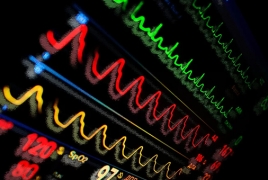Broken heart syndrome linked with cancer: study July 18, 2019 - 15:04 AMT PanARMENIAN.Net - One in six people with broken heart syndrome had cancer and they were less likely to survive for five years after it occurred, according to new international research in Journal of the American Heart Association, Medical Xpress says. Broken heart syndrome, also called takotsubo syndrome, occurs when the heart's main pumping chamber temporarily enlarges and doesn't pump well. Although the syndrome may feel like a heart attack, with chest pain and shortness of breath, there is no heart muscle damage and no blockage in the coronary arteries feeding the heart. Broken heart syndrome can be triggered by emotional or physical stress, but this international study of patients from 26 centers provides the strongest association yet between the syndrome and cancer. "Patients with broken heart syndrome might benefit if screened for cancer to improve their overall survival," said Christian Templin, M.D., Ph.D., senior author of the study and director of Interventional Cardiology of the Andreas Grüntzig Heart Catheterization Laboratories at the University Heart Center Zurich at The University Hospital Zurich in Switzerland. "Our study also should raise awareness among oncologists and hematologists that broken heart syndrome should be considered in patients undergoing cancer diagnosis or treatment who experience chest pain, shortness of breath, or abnormalities on their electrocardiogram," Templin said. Of 1,604 patients with broken heart syndrome in the International Takotsubo Registry, 267 patients or 1 in 6 (average age 69.5 years, 87.6 percent female) had cancer. The most frequent type of malignancy was breast cancer, followed by tumors affecting the gastrointestinal system, respiratory tract, internal sex organs, skin and other areas. Compared to those without cancer, researchers found that patients with cancer were: - Less likely to have experienced an emotional trigger for the syndrome, 18.0 percent vs. 30.3 percent. - More likely to have experienced a physical trigger (such as a medical intervention or physical trauma) prior to the syndrome, 47.9 percent vs. 34.2 percent. - Just as likely to survive for 30 days after the syndrome began, although more likely to die or require intensive heart and respiratory support while in the hospital. - More likely to die within 5 years after the syndrome began. The study was too small to analyze whether the worse prognosis in patients with broken heart syndrome and cancer might be due to a specific type or stage of cancer, or the cancer treatments received. "The mechanism by which malignancy and cancer treatment may promote the development of broken heart syndrome should be explored, and our findings provide an additional reason to investigate the potential cardiotoxic effects of chemotherapy," Templin said. Related links: Azerbaijani authorities report that they have already resettled 3,000 people in the Nagorno-Karabakh town of Stepanakert. On June 10, Azerbaijani President of Azerbaijan Ilham Aliyev will leave for Turkey on a working visit. Azerbaijani President Ilham Aliyev arrived in Moscow on April 22 to hold talks with Russian counterpart Vladimir Putin. Authorities said a total of 192 Azerbaijani troops were killed and 511 were wounded during Azerbaijan’s offensive. Partner news |